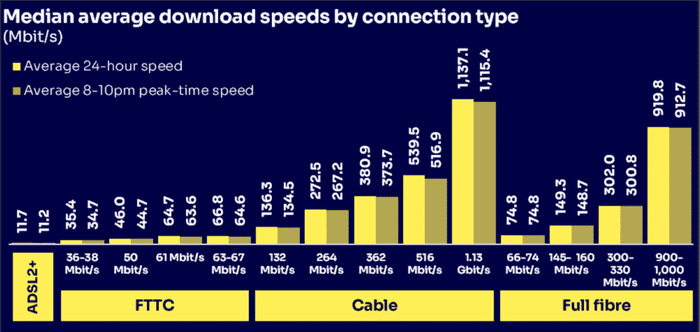UK broadband speeds rise, helped by cableUK broadband speeds rise, helped by cable
Home broadband speeds in the UK are increasing considerably with cable-based service offerings driving growth as much as full fibre, if not more.
September 15, 2023

Home broadband speeds in the UK are increasing considerably with cable-based service offerings driving growth as much as full fibre, if not more.
That’s according to a new study published by regulator Ofcom, whose headline finding showed that the median average download speed in the UK was up by 17% year-on-year, based on March 2023 data. That equates to an increase of 10.1 Mbps to 69.4 Mbps.
The increase – and it’s a fairly noteworthy one – comes “as people have upgraded to higher-bandwidth services, including full-fibre connections,” the regulator stated in a press release accompanying its new UK Home Broadband Performance report.
It’s easy therefore, to jump to the conclusion that full fibre uptake is driving the market; we certainly did. But a closer look at the report shows that while fibre is playing part, the biggest growth and the fastest speeds are coming from the cable sector. Indeed, Ofcom adjusted its wording in the report to note that upgrades “to higher-bandwidth services” are pushing average speeds up. Take-up of superfast broadband – that’s services with advertised download speeds of 30 Mbps or more – in the UK stood at 93% in March, up by two percentage points on the previous year and by eight compared with two years earlier.
The median average download speed for a cable service advertised at 1.13 Gbps came in at 1.14 Gbps over a 24-hour period, falling slightly during peak times, Ofcom noted (see chart). For full fibre plans advertised at 900 Mbps to 1 Gbps, the average download speed was 919.8 Mbps. Naturally, fibre-to-the-cabinet (FTTC) offerings had much lower speeds.

To dig in a little further, it was Virgin Media’s 1.13 Gbps offering that clocked up the leading speed for a cable package, hitting the download speed mentioned above; there was no other competitor in that segment. Meanwhile BT’s 900 Mbps fibre service was the fastest on full fibre at 925 Mbps, again over a 24-hour period.
Cable broadband connections saw the biggest increase in average download speed in the 12 months to March, increasing by 71.3 Mbps – or 36% – to 270.6 Mbps. Full fibre download speeds grew by 1.9 Mbps, or just 1%, to 149.2 Mbps on average.
In terms of upload, Gigaclear blew the competition out of the water with an average speed of 336.5 Mbps on its 300 Mbps full fibre offering. BT came a distant second, its 900 Mbps fibre offer clocking an average upload speed of 110 Mbps, followed by Sky’s 500 Mbps service with 65.4 Mbps. Virgin Media was a little further behind, its 1.1 Gbps service offering an average upload speed of 52.2 Mbps.
“While people can achieve improved performance through switching technology or package, there were few differences between comparable services offered by providers that use the same Openreach wholesale inputs,” Ofcom warned. That doesn’t apply to Virgin Media’s cable offers, of course.
Nonetheless, there is one area where full fibre still comes out on top. The effect of network congestion during busy periods was lowest for full-fibre lines, Ofcom pointed out. That’s a point worth noting for many people.
Get the latest news straight to your inbox. Register for the Telecoms.com newsletter here.
About the Author
You May Also Like










.png?width=300&auto=webp&quality=80&disable=upscale)


_1.jpg?width=300&auto=webp&quality=80&disable=upscale)